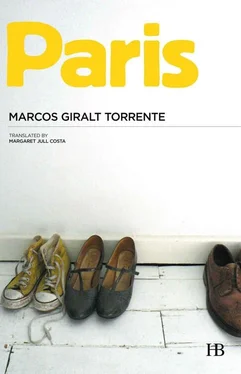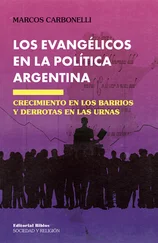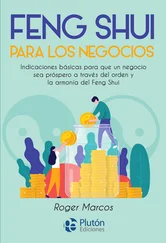Marcos Giralt Torrente - Paris
Здесь есть возможность читать онлайн «Marcos Giralt Torrente - Paris» весь текст электронной книги совершенно бесплатно (целиком полную версию без сокращений). В некоторых случаях можно слушать аудио, скачать через торрент в формате fb2 и присутствует краткое содержание. Год выпуска: 2014, ISBN: 2014, Издательство: Hispabooks, Жанр: Современная проза, на английском языке. Описание произведения, (предисловие) а так же отзывы посетителей доступны на портале библиотеки ЛибКат.
- Название:Paris
- Автор:
- Издательство:Hispabooks
- Жанр:
- Год:2014
- ISBN:9788494228452
- Рейтинг книги:5 / 5. Голосов: 1
-
Избранное:Добавить в избранное
- Отзывы:
-
Ваша оценка:
- 100
- 1
- 2
- 3
- 4
- 5
Paris: краткое содержание, описание и аннотация
Предлагаем к чтению аннотацию, описание, краткое содержание или предисловие (зависит от того, что написал сам автор книги «Paris»). Если вы не нашли необходимую информацию о книге — напишите в комментариях, мы постараемся отыскать её.
Paris — читать онлайн бесплатно полную книгу (весь текст) целиком
Ниже представлен текст книги, разбитый по страницам. Система сохранения места последней прочитанной страницы, позволяет с удобством читать онлайн бесплатно книгу «Paris», без необходимости каждый раз заново искать на чём Вы остановились. Поставьте закладку, и сможете в любой момент перейти на страницу, на которой закончили чтение.
Интервал:
Закладка:
“I can’t even say for sure that I was the only one who felt like that. Here I am trying to explain when or how I became aware that we would never live together again, when maybe he was the one who decided. He probably preempted any decision I might have made and has continued to act accordingly. Not that it makes much difference.”
I hear the unspoken bitterness in those last words, the first time I’ve heard her speak reproachfully of my father in my presence, and I’m not surprised. I consider it further confirmation of the definitive nature of this conversation, which will be the last of its kind once it’s over, there will be no others; whatever we do or whatever we become in the future will be built on what she tells me today, whatever she doesn’t tell me today, she will never tell me, because it would be suicidal to recant. I would never believe her again. This moment is too serious. She remains silent and, with a resolute movement, stubs out her cigarette and places the ashtray on the table while I ponder her words and, thanks to the pause, discover something I hadn’t noticed. Up until now, she has spoken in the first person, taking it as read that she was responsible for the breakup; she hadn’t previously left open the possibility that the breakup was initiated by him, and her silence on the matter betrays her, allows for such a possibility to exist. Otherwise, she would have been vaguer.
“But whether or not he did preempt my decision, the truth is that he never did anything to disillusion me, because I never had any illusions about him. Delfina thinks I did, because she can’t imagine any more powerful mandate than that of our instinct telling us not to take any risks in life that might lead to disaster. That’s the way she is, but not me. I knowingly chose that path; I knew all the obstacles awaiting me. It didn’t occur to me to think there might be no hope, because I knew from the start that there wasn’t. It’s just that everything has an end, and I suppose I’ve reached that end, but I’ve reached it without anything having happened that required it to end. That’s how it usually is. We may not always want to accept the fact, but we’re in constant motion. No one can guarantee anyone their unconditional love. Only the love between parents and their children is unconditional, and perhaps not even then. We mothers are very egotistical and would like to think that love between mother and child is unconditional, but it isn’t. We are clear proof that nothing lasts. There is no loyalty like that of a mother’s loyalty to her child, and yet all mothers know there will come a time when that child will break free and create his or her own bonds. However, that certainty, which I accept, that future lack of reciprocity, neither erases nor diminishes a mother’s love. It’s the same with other feelings. We don’t need our love to be requited in order to love someone else, just as we don’t need someone else to despise or hate us in order to despise or hate them. Often we choose the object of our affection without considering whether that person will feel the same, and often our idea of that person is very different from his idea of himself or his expectations of life or of us.”
My mother sets out her arguments in the safety of the surrounding darkness, and every word she says moves her a little further away from the city that, for me, sums up the whole situation. The intentions behind her words become increasingly enigmatic, and I feel myself growing increasingly insubstantial and adrift, however hard I try to hang on to what I want to know, to the reason why we’re here together. I find myself letting go of that completely. My mother’s very autonomy troubles and frightens me, as does the goal toward which her endless explanations are taking us, explanations I’m sure now she has been working on ever since the argument with my aunt twenty-four hours ago and that were already there in what she said about herself and in the complaints, dredged up from the past, that she continued to talk about after I entered the room. Her words trouble me, because they are a trap and there is no way out of them, they create yet another circle in our very singular relationship.
“People can be absolutely open about themselves and yet we still insist on seeing them differently, investing all our hope in someone who never offered us hope, who wanted something quite different. Is it reasonable, then, when our blindness ends and we see reality for what it is, that we should blame that person, who probably never even intended to be what we wanted him to be? I don’t think so.”
My mother said this more to herself than for me to hear, and meanwhile, I’m still thinking about Paris and trying to cling to that name in order to dilute the fear beginning to invade me, the fear that, even though she may be lying now, later on, she’ll tell the truth, and that truth might set in motion something far worse than the present lie. For a moment, she stays silent, as if she had gotten lost, then she says, “I say this because I can’t be sure that wasn’t the case with us. It’s just pointless speculation. Perhaps he’s just as he was when I first met him and perhaps not. I’m the least qualified person to know. I’m inclined to think that the problem is that he’s always been two people at once, and that makes life impossible. It’s possible for a few years, but later on, life forces you to make a choice, and then it’s not possible at all. I don’t know, that’s just an idea. I also can’t be sure that I’m not the one who changed. But we’re probably just the same as we were then, which doesn’t mean that, right from the start, he didn’t love me or that I got ahold of completely the wrong end of the stick. You can’t understand, because you’ve just been a witness, a bystander. Ever since you can remember, you’ve experienced the past through my eyes. The only thing you know about that past is what I’ve told you, and you know little about his present. But I know that he loved me. I’m sure of that. He may not have shown it in the way Delfina or I would have liked, but he did love me. Who knows, he may still love me. Abandoning someone or being disloyal to them isn’t necessarily a sign that you don’t care. Neither is lying to or deceiving them. One often lies to and deceives the person one loves most in order to preserve their love, or to protect them. Whatever he may or may not have done over the years is no indication of his lack of commitment or of his feelings not being genuine. And me saying now that it’s all over doesn’t mean that I regret the past, that I wouldn’t do the same again. The things I tolerated or that satisfied me yesterday might not seem satisfactory or tolerable now, but that doesn’t cancel out the past, when they did seem satisfactory and tolerable. Besides, I don’t think he expects anything else. If he had expected anything, it would have been for me to throw in the towel sooner. I’m sure that he’s been living as if on borrowed time. We’ve known each other for so long. He always knew how far he could go, and I always knew what I could realistically expect. He drove me to despair, drove me crazy sometimes, but that doesn’t change anything. For me, he’s like a brother, and brothers can be disappointing and exhausting, but you still love them, even though you’d rather keep them at arm’s length.”
My mother shifts in her armchair, but I can barely see her now. I can just make out the shape of her body against the back of the chair, hear the tinkle of her bracelets and see the beige blur of her jersey as she bends forward over the table to take another cigarette. The flame from her lighter briefly illuminates her serious, concentrated face, her cheeks sucked in by the movement of her lips drawing in the smoke, and then it’s gone, to be replaced by the elusive firefly of her cigarette tip retreating once more to the armchair, which again grows wrinkled and mutable, not smooth and still, against the greenish, mauvish blue of the window behind her. It must be about half past seven, no later than that; we haven’t even been here for an hour yet, but the brisk winter night has taken over unopposed, and the room lies now in almost total darkness, relieved only by the faint glow of the evening that was and by the dim lights from the building across the street. “One often lies to and deceives the person one loves most in order to preserve their love, or to protect them.” While my mother maintains a smoke-filled silence, I think about those words, which, if I thought her capable of such imprudence, it would seem she said deliberately. The two reasons she gives are quite different, and she didn’t make that distinction by chance, even though her words weren’t specifically aimed at me. The protecting lie is the one you admit to when there’s no longer any need to protect, and the lie intended to preserve love is the one you never reveal. I think this reluctantly and wonder how much my mother will keep silent about until the end of her days and how much she is holding back until the time comes for it to be told. And when the smoke-filled silence continues, I think about what she said about love between siblings, which was even less likely to have been aimed at me, but which, nonetheless, stirs and touches me. Can you really feel that someone is your brother even if he isn’t? Will I ever feel that, even though I won’t know how to identify the feeling because I have no brothers and never will? These two questions burst into my consciousness, bringing with them the echo of things not experienced and possibly never to be experienced, but they fade out and disappear equally quickly, because they are merely a pointless diversion from the disquiet roused in me by my mother’s words, her unusual loquacity, the certainty that nothing will change when she stops talking, apart, perhaps, from there being a still stronger bond between us, the noose drawn still tighter, the noose that smarts and tugs even though it’s for my own good and even though it is far from her intention to cause me pain. Where exactly is she going? What building is she going to erect on the foundations she is laying down?
Читать дальшеИнтервал:
Закладка:
Похожие книги на «Paris»
Представляем Вашему вниманию похожие книги на «Paris» списком для выбора. Мы отобрали схожую по названию и смыслу литературу в надежде предоставить читателям больше вариантов отыскать новые, интересные, ещё непрочитанные произведения.
Обсуждение, отзывы о книге «Paris» и просто собственные мнения читателей. Оставьте ваши комментарии, напишите, что Вы думаете о произведении, его смысле или главных героях. Укажите что конкретно понравилось, а что нет, и почему Вы так считаете.












